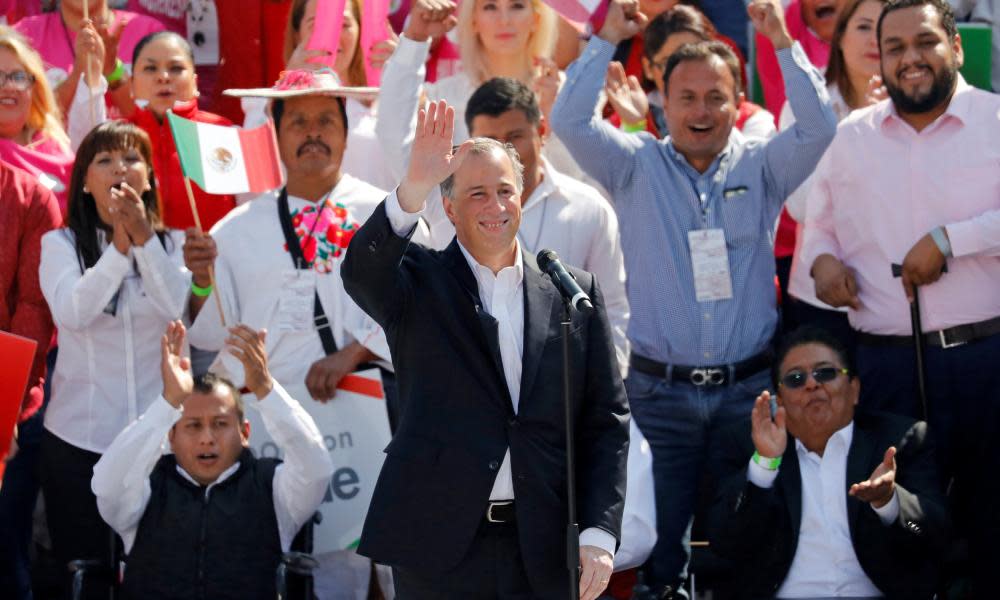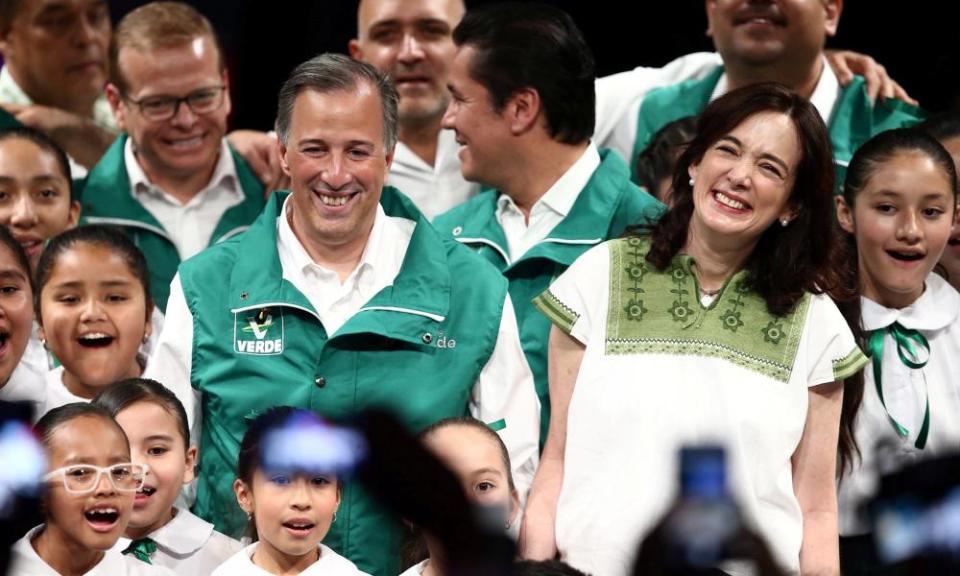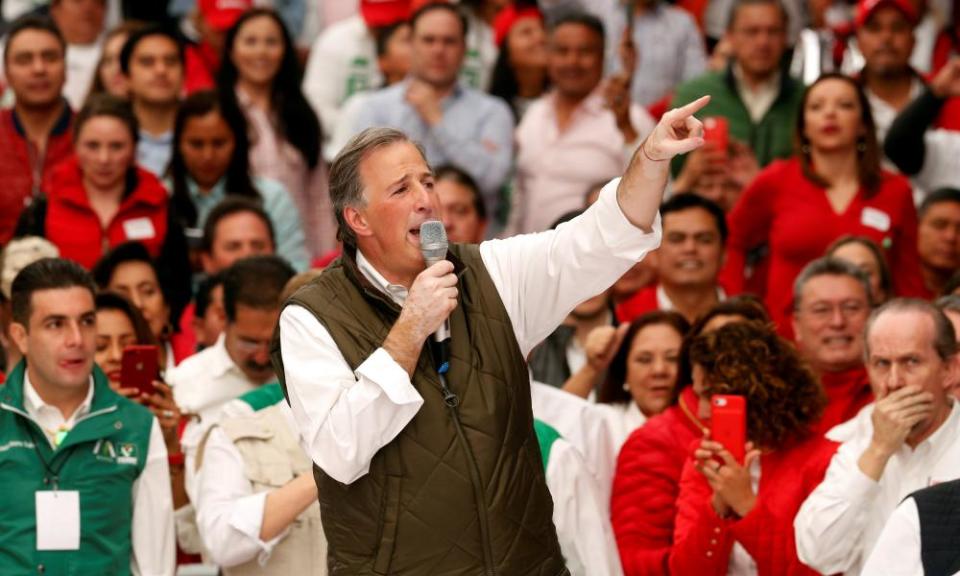José Antonio Meade: Mexico's common man struggles to connect

José Antonio Meade, the presidential candidate for Mexico’s ruling party, drives his own Honda Fit rather than being chauffeured in the bulletproof SUVs preferred by most politicians.
He flies commercial rather than renting private jets, and tweets about ordinary activities such as strolling through central Mexico City with his family and taking in a Mixtec art and cultural exhibition. Even a grainy photo of his wife, Juana Cuevas, shopping in the supermarket surfaced on social media – as if to contrast her ordinariness with the opulence of the country’s soap opera star first lady.
Meade has sold himself as a common man in a country where close to half the population is considered poor, but the political class pays itself handsomely and accumulates inexplicable fortunes. He has also sold himself as normal, clean and competent – a far cry from the accusations of corruption, cronyism and incompetence crippling the administration of President Enrique Peña Nieto and the ruling Institutional Revolutionary party (PRI).
People close to Meade and Cuevas, an artist fond of embroidered huipiles, describe them as normal and authentic.
Analysts say Meade’s common man persona is an attempt to distance himself from the Peña Nieto administration, which he has served in from the start in three cabinet posts. But the strategy is falling flat, and Meade’s softly spoken speeches and technocratic track record have failed to excite the masses.
“This guy has been up on the auction block and nobody’s buying,” said Federico Estévez, political science professor at the Autonomous Technological Institute of Mexico.
With the common man shtick “he’s saying that he’s not an asshole politician”, Estévez said. “He’s saying that he hasn’t stolen the country blind and doesn’t have a lifestyle worthy of the cover of [the society glossy] ¡Hola!.”

The current PRI campaign contrasts sharply with 2012, when Peña Nieto presented himself as the picture of success and the fresh face of a party lampooned in editorial cartoons as a dinosaur. Women would wave signs propositioning him at rallies and supporters would wait patiently for selfies with his wife, Angelica Rivera.
Governing has been another matter. Peña Nieto quickly won approval for a suite of structural reforms, but he oversaw an inept response to the disappearance of 43 students and became bogged down in a series of scandals. Investigative reporters later discovered Rivera had bought their $7m mansion from a government contractor.
Why did Mexico launch its war on drugs?
On 10 December 2006, president Felipe Calderón, launched Mexico’s war on drugs by sending 6,500 troops into his home state of Michoacán, where rival cartels were engaged in tit-for-tat massacres.
Calderón declared war eight days after taking power – a move widely seen as an attempt to boost his own legitimacy after a bitterly contested election victory. Within two months, around 20,000 troops were involved in operations across the country.
What has the war cost so far?
The US has donated at least $1.5bn through the Merida Initiative since 2008, while Mexico has spent at least $54bn on security and defence since 2007. Critics say that this influx of cash has helped create an opaque security industry open to corruption at every level.
But the biggest costs have been human: since 2007, around 230,000 people have been murdered and more than 28,000 reported as disappeared. Human rights groups have also detailed a vast rise in human rights abuses by security forces.
As the cartels have fractured and diversified, other violent crimes such as kidnapping and extortion have also surged. In addition, hundreds of thousands of people have been displaced by violence.
What has been achieved?
Improved collaboration between the US and Mexico has resulted in numerous high-profile arrests and drug busts. Officials say 25 of the 37 drug traffickers on Calderón’s most-wanted list have been jailed, extradited to the US or killed, although not all of these actions have been independently corroborated.
The biggest victory – and most embarrassing blunder – under Peña Nieto’s leadership was the recapture, escape and another recapture of Joaquín “El Chapo” Guzmán, leader of the Sinaloa cartel.
While the crackdown and capture of kingpins has won praise from the media and US, it has done little to reduce the violence.
How is the US involved?
Mexico’s decade-long war on drugs would never have been possible without the huge injection of American cash and military cooperation under the Merida Initiative. The funds have continued to flow despite growing evidence of serious human rights violations.
Turning around the PRI’s unpopular image is proving difficult, especially as Mexico suffers record rates of homicide, salaries stagnate and perceptions of corruption creep upward.
A poll published in the Reforma newspaper showed Meade receiving just 14% support for the 1 July election, putting him in a distant third behind the leftist-populist Andrés Manuel López Obrador – who projected an austere image as the mayor of Mexico City, living in a modest apartment and driving a small sedan. Ricardo Anaya, the candidate for an unwieldy left-right coalition, appears to have consolidated second spot.
Even more problematic for the PRI a poll from Buendía y Laredo found 65% of Mexicans saying they had never voted PRI.
Picking Meade was “part of a formula to make the PRI candidate acceptable”, said Carlos Bravo Regidor, professor at the Centre for Research and Teaching in Economics. “But it seems to be the other way around – [the] PRI brand is tainting him.”

Meade, 49, brings a hefty resume to the race. A technocrat with a PhD from Yale, he has held four cabinet posts – including two turns as finance minister under presidents from different parties: Peña Nieto and Felipe Calderón.
He can boast a clean track record. Critics, though, point to rising inflation during his stint as finance minister and his rebuking the UN special rapporteur on torture for an unflattering report while he was foreign minister.
“He has had the [cabinet] positions,” Bravo said, “but has he done something worth remembering with them?”
Meade has proposed attacking drug cartels’ finances, improving teacher pay and keeping the structural reforms intact. He has promised to curb corruption – often doing so in the presence of controversial PRI politicians – while surrogates have tarred López Obrador as a scary populist secretly plotting to turn Mexico into Venezuela.
On Sunday Meade unveiled his own populist proposal: the “national registry of every person’s necessities” – details of which are still pending.
Social media mocked the idea as improvised, with one analyst tweeting: “It almost sounds like an episode of Monty Python.”
PRI supporters, meanwhile, express support for Meade – not a priísta – but in the vaguest of terms.
“He has good proposals” said Esther Sánchez, a lifelong PRI supporter, at a recent Meade rally. When asked which proposals she liked, Sánchez responded: “We’ll do well with him.”

 Yahoo News
Yahoo News 
